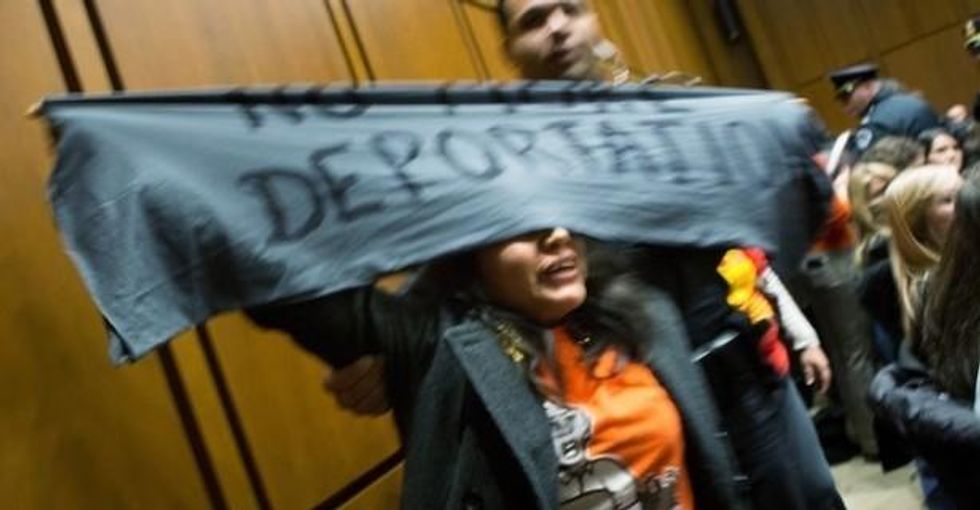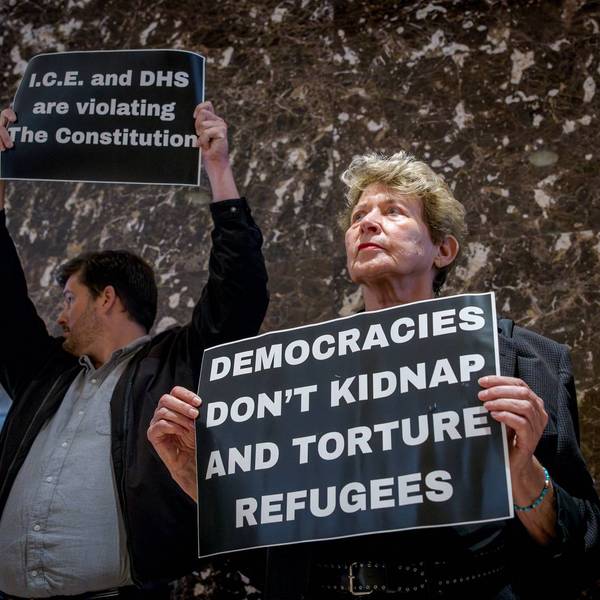Immigration Reform Set to Boost Business, Undermine Rights
As D.C. politicians quibble over immigration-reform details, their plans all make the same mistakes.

So far, the White House and a bipartisan group of Senators have each floated similar outlines for reform that include a process for legalization or citizenship, recruitment of foreign-born workers into select industries, and strict "border security" measures. The details of leaked White House draft plan, prepared as a "back up" to the congressional proposals, were reported by USA Today this weekend. Despite criticism from conservatives, the draft also emphasizes stronger enforcement of immigration laws.
Though the various efforts all aim to fashion a "comprehensive" reform package, any resulting legislation will likely be anything but: While lawmakers squabble over how broad or narrow to make the legalization process, activists fear Congress may simply erect a bureaucratic dam in place of a broken border wall, let corporations control the floodgates, and still exclude millions of immigrants.
Both President Obama and the Senate group endorse special visa programs for specific sectors that, not coincidentally, wield lobbying influence. The agricultural industry pushed for, and got, promises of visas for migrant farmworkers. At the other end of the economic spectrum, Silicon Valley moguls successfully advocated visas for science and technology professionals. Such limited visas are usually called "guestworker" programs, although the Washington proposals shy away from the controversial term.
According to talking points emerging from the White House and the Senate group, another special channel of relief may be opened for undocumented youth, following high-profile, media-savvy mobilizations to support the DREAM Act, which would legalize undocumented students. (In response to continued stagnation on the legislation in Congress, Obama issued a scaled-down administrative directive in August to defer deportations for DREAM-eligible youth).
An Urgent Message From Our Co-Founder
Dear Common Dreams reader, The U.S. is on a fast track to authoritarianism like nothing I've ever seen. Meanwhile, corporate news outlets are utterly capitulating to Trump, twisting their coverage to avoid drawing his ire while lining up to stuff cash in his pockets. That's why I believe that Common Dreams is doing the best and most consequential reporting that we've ever done. Our small but mighty team is a progressive reporting powerhouse, covering the news every day that the corporate media never will. Our mission has always been simple: To inform. To inspire. And to ignite change for the common good. Now here's the key piece that I want all our readers to understand: None of this would be possible without your financial support. That's not just some fundraising cliche. It's the absolute and literal truth. We don't accept corporate advertising and never will. We don't have a paywall because we don't think people should be blocked from critical news based on their ability to pay. Everything we do is funded by the donations of readers like you. Will you donate now to help power the nonprofit, independent reporting of Common Dreams? Thank you for being a vital member of our community. Together, we can keep independent journalism alive when it’s needed most. - Craig Brown, Co-founder |

So far, the White House and a bipartisan group of Senators have each floated similar outlines for reform that include a process for legalization or citizenship, recruitment of foreign-born workers into select industries, and strict "border security" measures. The details of leaked White House draft plan, prepared as a "back up" to the congressional proposals, were reported by USA Today this weekend. Despite criticism from conservatives, the draft also emphasizes stronger enforcement of immigration laws.
Though the various efforts all aim to fashion a "comprehensive" reform package, any resulting legislation will likely be anything but: While lawmakers squabble over how broad or narrow to make the legalization process, activists fear Congress may simply erect a bureaucratic dam in place of a broken border wall, let corporations control the floodgates, and still exclude millions of immigrants.
Both President Obama and the Senate group endorse special visa programs for specific sectors that, not coincidentally, wield lobbying influence. The agricultural industry pushed for, and got, promises of visas for migrant farmworkers. At the other end of the economic spectrum, Silicon Valley moguls successfully advocated visas for science and technology professionals. Such limited visas are usually called "guestworker" programs, although the Washington proposals shy away from the controversial term.
According to talking points emerging from the White House and the Senate group, another special channel of relief may be opened for undocumented youth, following high-profile, media-savvy mobilizations to support the DREAM Act, which would legalize undocumented students. (In response to continued stagnation on the legislation in Congress, Obama issued a scaled-down administrative directive in August to defer deportations for DREAM-eligible youth).

So far, the White House and a bipartisan group of Senators have each floated similar outlines for reform that include a process for legalization or citizenship, recruitment of foreign-born workers into select industries, and strict "border security" measures. The details of leaked White House draft plan, prepared as a "back up" to the congressional proposals, were reported by USA Today this weekend. Despite criticism from conservatives, the draft also emphasizes stronger enforcement of immigration laws.
Though the various efforts all aim to fashion a "comprehensive" reform package, any resulting legislation will likely be anything but: While lawmakers squabble over how broad or narrow to make the legalization process, activists fear Congress may simply erect a bureaucratic dam in place of a broken border wall, let corporations control the floodgates, and still exclude millions of immigrants.
Both President Obama and the Senate group endorse special visa programs for specific sectors that, not coincidentally, wield lobbying influence. The agricultural industry pushed for, and got, promises of visas for migrant farmworkers. At the other end of the economic spectrum, Silicon Valley moguls successfully advocated visas for science and technology professionals. Such limited visas are usually called "guestworker" programs, although the Washington proposals shy away from the controversial term.
According to talking points emerging from the White House and the Senate group, another special channel of relief may be opened for undocumented youth, following high-profile, media-savvy mobilizations to support the DREAM Act, which would legalize undocumented students. (In response to continued stagnation on the legislation in Congress, Obama issued a scaled-down administrative directive in August to defer deportations for DREAM-eligible youth).

